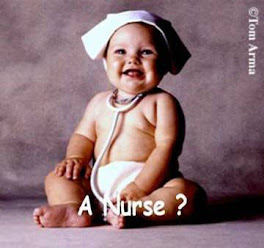 The last few weeks were difficult for our unit. We lost three patients close together. Two of the three patients were patients my preceptor and I had the weeks before. Nursing puts us all in that delicate position of helping people at their most vulnerable hours of sickness and death. One of the unique aspects of what we all do, is that when we go to work, we never know what the day will bring.
The last few weeks were difficult for our unit. We lost three patients close together. Two of the three patients were patients my preceptor and I had the weeks before. Nursing puts us all in that delicate position of helping people at their most vulnerable hours of sickness and death. One of the unique aspects of what we all do, is that when we go to work, we never know what the day will bring.This week, however, my preceptor allowed me to take the ball and run with the patients I wanted. I always try to challenge myself to pick patients who are the "sickest"...however, in oncology, everyone is usually pretty sick, so the two I picked this week were a great opportunity to exercise old skills learned in m
 ed-surg. Taking and giving report, assuming total care, planning, assessments, interventions and evaluations. How would I plan and approach the day? Since I had good role modeling from my preceptor, I decided to use "her" method and hit the ground running the way she does. We round on our patients in the AM, pull labs and meds and bring everything at once to do assessments. This allows for the unexpected admission in the morning, the surprise fall backs and any other delays that frustrate any nurses' best laid plans. It also allows us plenty of time in the room, avoiding the back and forth. So, while one med is running over 10 mins, I can assess other things, do a little teaching and reassess before the next one is given.
ed-surg. Taking and giving report, assuming total care, planning, assessments, interventions and evaluations. How would I plan and approach the day? Since I had good role modeling from my preceptor, I decided to use "her" method and hit the ground running the way she does. We round on our patients in the AM, pull labs and meds and bring everything at once to do assessments. This allows for the unexpected admission in the morning, the surprise fall backs and any other delays that frustrate any nurses' best laid plans. It also allows us plenty of time in the room, avoiding the back and forth. So, while one med is running over 10 mins, I can assess other things, do a little teaching and reassess before the next one is given.The oppty to reconstitute and administer meds, try things with patients with my PRNs to see if they would help. These are all the things I love about nursing and of course, patient teaching. I know I probably won't always be this optimistic, but I like to see nurses who still love what they do 20 years later. It is the kind of nurse I hope to be.
While my patients weren't as critical this week as they were in the previous two weeks, I loved the independence of trying to do everything on my own, classifying, and getting all my charting done and being able to measure over the course of several days how decisions I made, impacted my patients. Running never felt so good!










